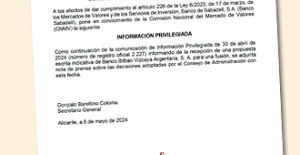Although friendship is a vital part of a person’s life, 49% of Spaniards admit they have never told their closest friends "I love you" despite the many benefits it brings. This is the key conclusion of Ron Brugal's study "What we never share with each other", which aims to examine what Spanish friends don't say and why they don’t talk about certain topics.
A sociological survey of more than 1000 people aged 18 to 65 revealed that Spaniards regard their friends as one of their primary sources of support. They also feel grateful towards them and take their feelings for granted more often. They talk about them. According to 30% of respondents, "because it's not necessary" was the most common reason they didn't say "I love you" to their friends. This is ahead of "because of the occasion" and "because I don't usually express my feelings towards my friends", which were 26% and 25% respectively.
These results show that there is a significant difference in feelings shared with friends and family versus with a partner. For example, 32% of participants heard their partner say "I love you" every day. Only 9% of them said it to their family every day and only 4% to their friends. In most situations, this tendency to say the least to friends or to talk about feelings is evident.
It's rewarding, but it can be difficult
47 percent of participants said they feel supported and understood when they share their feelings with friends. Although the feelings are good after the fact, the Spaniards still feel awkward (36%), embarrassed (45%), and even weak (47%). Only 1 in 4 people feel "very comfortable" sharing their feelings with friends, which is a higher percentage among women (17%) than it is among men (10%).
55% of respondents found that it is easier to have these kinds of conversations if there is an excuse. These situations are not the only ones that require emotional openness. Parties are where friends are more comfortable talking about their feelings. 35% of respondents said they prefer parties, followed by 25% who say they choose getaways or trips, and 23% who prefer to talk directly via WhatsApp.
The majority of Spaniards have more positive feelings than negative ones and they talk to their friends more often. 41% of respondents never discuss negative emotions (frustration, fear, etc.) with their friends.
Another conclusion of the study is therefore not surprising: vulnerability is an ongoing issue among friends. The majority of votes for the question "With whom is it most difficult to be vulnerable?" went to the circle friends. Nearly half of respondents chose it (47%), beating the choice of family (35%), and the couple (13%). The level of intimacy can make a big difference in how the situation turns out. It is difficult to be vulnerable with friends, but not with our closest friend. This option was chosen by only 5%.
The most striking thing about this survey's results is the wide gap between how we feel toward our friends and what they say. Nearly 8 in 10 respondents admit that they don't see their friends as much as they should and 6 in 10 say they talk less to them than they would prefer. 62% of participants admit to not telling their friends or nearly never that they miss them.
Nearly two out of 10 participants never thanked their friends for their friendship, despite all the reasons to be thankful. If they had to choose a phrase to thank their friends for their friendship, they would say "thanks" for being there, "thanks to you for listening to me", or "thanks to support me."

 Sabadell rejects the merger with BBVA and will fight to remain alone
Sabadell rejects the merger with BBVA and will fight to remain alone In Germany, the far left wants to cap the price of “doner kebabs”
In Germany, the far left wants to cap the price of “doner kebabs” Israel-Hamas war: Gaza between hope of truce and fear of Israeli offensive in the South
Israel-Hamas war: Gaza between hope of truce and fear of Israeli offensive in the South “Mom, Dad, please don’t die”: in the United States, a nine-year-old child saves the lives of his parents injured in a tornado
“Mom, Dad, please don’t die”: in the United States, a nine-year-old child saves the lives of his parents injured in a tornado The presence of blood in the urine, a warning sign of bladder cancer
The presence of blood in the urine, a warning sign of bladder cancer A baby whose mother smoked during pregnancy will age more quickly
A baby whose mother smoked during pregnancy will age more quickly The euro zone economy grows in April at its best pace in almost a year but inflationary pressure increases
The euro zone economy grows in April at its best pace in almost a year but inflationary pressure increases Children born thanks to PMA do not have more cancers than others
Children born thanks to PMA do not have more cancers than others “House of the Dragon”, “Succession”… Max, the new streaming platform from HBO and Discovery, launched in France on June 11
“House of the Dragon”, “Succession”… Max, the new streaming platform from HBO and Discovery, launched in France on June 11 The A13 motorway will finally reopen this Friday, in one direction only
The A13 motorway will finally reopen this Friday, in one direction only TNT commission of inquiry: tensions between LFI deputies and Macronists before the vote on the report
TNT commission of inquiry: tensions between LFI deputies and Macronists before the vote on the report Apple unveils a new, more efficient iPad range
Apple unveils a new, more efficient iPad range The Gaza War invites itself to the 2024 Pulitzer Prizes
The Gaza War invites itself to the 2024 Pulitzer Prizes Judith Godrèche presents a short film on sexual violence in Cannes
Judith Godrèche presents a short film on sexual violence in Cannes Kevin Spacey: new trial in sight in London for the American actor, for sexual assault
Kevin Spacey: new trial in sight in London for the American actor, for sexual assault Taylor Swift fans make London pub Black Dog their new place of pilgrimage
Taylor Swift fans make London pub Black Dog their new place of pilgrimage Omoda 7, another Chinese car that could be manufactured in Spain
Omoda 7, another Chinese car that could be manufactured in Spain BYD chooses CA Auto Bank as financial partner in Spain
BYD chooses CA Auto Bank as financial partner in Spain Tesla and Baidu sign key agreement to boost development of autonomous driving
Tesla and Baidu sign key agreement to boost development of autonomous driving Skoda Kodiaq 2024: a 'beast' plug-in hybrid SUV
Skoda Kodiaq 2024: a 'beast' plug-in hybrid SUV The home mortgage firm rises 3.8% in February and the average interest moderates to 3.33%
The home mortgage firm rises 3.8% in February and the average interest moderates to 3.33% This is how housing prices have changed in Spain in the last decade
This is how housing prices have changed in Spain in the last decade The home mortgage firm drops 10% in January and interest soars to 3.46%
The home mortgage firm drops 10% in January and interest soars to 3.46% The jewel of the Rocío de Nagüeles urbanization: a dream villa in Marbella
The jewel of the Rocío de Nagüeles urbanization: a dream villa in Marbella Institutions: senators want to restore the accumulation of mandates and put an end to the automatic presence of ex-presidents on the Constitutional Council
Institutions: senators want to restore the accumulation of mandates and put an end to the automatic presence of ex-presidents on the Constitutional Council Europeans: David Lisnard expresses his “essential and vital” support for François-Xavier Bellamy
Europeans: David Lisnard expresses his “essential and vital” support for François-Xavier Bellamy Facing Jordan Bardella, the popularity match turns to Gabriel Attal’s advantage
Facing Jordan Bardella, the popularity match turns to Gabriel Attal’s advantage Europeans: a senior official on the National Rally list
Europeans: a senior official on the National Rally list These French cities that will boycott the World Cup in Qatar
These French cities that will boycott the World Cup in Qatar “The future is for us”: “disappointed” and “proud” at the same time, Al-Khelaïfi sees the glass half full after the elimination of PSG
“The future is for us”: “disappointed” and “proud” at the same time, Al-Khelaïfi sees the glass half full after the elimination of PSG PSG: “Since January, these have not been my best matches,” agrees Zaire-Emery, who promises to “come back stronger”
PSG: “Since January, these have not been my best matches,” agrees Zaire-Emery, who promises to “come back stronger” “What is this question, honestly?” : Nasser Al-Khelaïfi (very) annoyed after PSG-Dortmund
“What is this question, honestly?” : Nasser Al-Khelaïfi (very) annoyed after PSG-Dortmund “I am the guy who has to score the goals”: Mbappé does not hide and assumes responsibility after PSG’s exit
“I am the guy who has to score the goals”: Mbappé does not hide and assumes responsibility after PSG’s exit


















